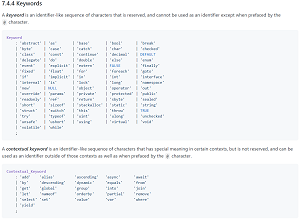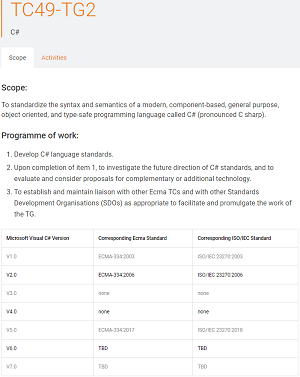News
Microsoft Opens Up C# Standardization Work
C# standardization is now being carried out in an open source GitHub repo that details ongoing work to document the standard for the latest C# language versions.
The goal of the move, which brings the work out into the open under the direction of the .NET Foundation, is a more accurate standard for those versions. The foundation is an independent, non-profit organization supporting an open-source ecosystem around the .NET platform.
"Moving the standards work into the open, under the .NET Foundation, makes it easier for standardization work," Microsoft said in an April 5 blog post. "Everything from language innovation and feature design through implementation and on to standardization now takes place in the open."
The new GitHub repo is a huge list of just about everything to do with C#, from tokens to statements to namespaces. For example, here's part of the section on keywords:
 [Click on image for larger view.] C# Keywords (source: GitHub).
[Click on image for larger view.] C# Keywords (source: GitHub).
Proposed C# language standards will still be proposed by the ECMA C# standards committee (TC-49-TG2), with the change effectively just making the work more transparent by providing a public working space for the committee. That means C# developers can pose public questions to the language design team, compiler implementers and the standards committee.
 [Click on image for larger view.] TC49-TG2 (source: ECMA International).
[Click on image for larger view.] TC49-TG2 (source: ECMA International).
"You can see work in progress on the standard text for C# 6," Microsoft said. "This work merges the draft spec currently hosted in the csharplang repository with the current C# 5.0 standard text. Work on incorporating the C# 7 features is taking place as well. See the C# 7 draft branch for progress."
Because Microsoft earlier open sourced C# compilers and subsequently split off another GitHub repo for the innovation and evolution of C#, there are now three such repos dedicated to the company's flagship programming language:
About the Author
David Ramel is an editor and writer at Converge 360.